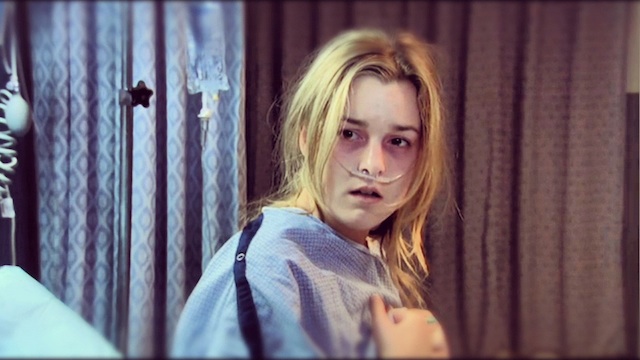Adelaide is fine example of an off-beat romance—a much beloved, but under-represented genre in short film. In the feature film world misfit matchings like in Benny and Joon or Harold and Maude have become enduring classics, but I struggle to find comparable examples in short film. What Adelaide does well—stay true to its rich, nuanced, characterizations—is difficult and helps explain the dearth.
Adelaide is titled after its main character, an attractive well-to-do young woman afflicted with Münchausen syndrome, a disorder characterized by the feigning of illness to attract sympathy. Adelaide’s is an especially dark variety of the syndrome, as she frequently will put herself into dangerous positions in order to get closer to her (married) physician. After her latest self-inflicted episode she is firmly rebuffed by the doctor and in her depressed aftermath we come to see the depth of her isolation and loneliness. Heeding her doctor’s advice to “find someone her own age”, she begins to court a shy pharmacist hoping to find the companionship and understanding that has been missing in her life.
What I think makes romance generally unsuited to the short form is its reliance on time and change. Like a good relationship, romances need viewers to develop a bond with the characters and that bond is reflected back by the character’s relationship onscreen. In a good romance you’re slowly falling for the characters as you see them fall for each other. It is hard to simulate this except by screentime and a diversity of scenes, hence the frequently taken shortcut of montage.
At 12 minutes Adelaide is about as short as a romance can be while showing romance rather than asserting it. And while effective, the romance is not top-notch due to this limitation—I’m reluctant to claim that I developed true empathy with the characters. What Greenfield-Sanders wisely side-steps though is the concept of change. It is the most troubling part of even feature film romances, as the transformations depicted generally ring hollow. Change is hard. I mean if you’re out of college that statement is pretty self-evident, correct? What’s great about Adelaide is that the character arc is not about change, but acceptance. By finding a match that fits her proclivities, Adelaide is an example that we don’t need to be thinner, funnier, more sensitive more ambitious (or less self-destructive) to find our match. That is a welcome message I think.
This compare and contrast between features and shorts is a relevant conversation in Greenfield-Sanders case, because she does have an Adelaide feature film adaptation scripted. The project was accepted to both the Sundance Screenwriter, and Director Labs—a very prestigious honor—one that often proves invaluable in enabling promising filmmakers to make their debut feature. For example, Beasts of the Southern Wild was a film that came out of the Sundance Labs. Adelaide is a great short, but I have a feeling that it will make an even better feature. Follow Liliana on Twitter for more news updates. Oh and if you’re curious about Adelaide, she’s on Twitter too. 

 Jason Sondhi
Jason Sondhi